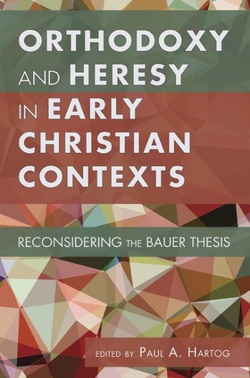posts
|
I am encouraged to see that this book of essays has been released. I had the privilege to co-author chapter 7 (with David Alexander) on Christian thought in the early North African church.
The publisher (Wipf and Stock) offers the following summary: Eighty years ago, Walter Bauer promulgated a bold and provocative thesis about early Christianity. He argued that many forms of Christianity started the race, but one competitor pushed aside the others, until this powerful "orthodox" version won the day. The victors re-wrote history, marginalizing all other perspectives and silencing their voices, even though the alternatives possessed equal right to the title of normative Christianity. Bauer's influence still casts a long shadow on early Christian scholarship. Were heretical movements the original forms of Christianity? Did the heretics outnumber the orthodox? Did orthodox heresiologists accurately portray their opponents? And more fundamentally, how can one make any objective distinction between "heresy" and "orthodoxy"? Is such labeling merely the product of socially situated power? Did numerous, valid forms of Christianity exist without any validating norms of Christianity? This collection of essays, each written by a relevant authority, tackles such questions with scholarly acumen and careful attention to historical, cultural-geographical, and socio-rhetorical detail. Although recognizing the importance of Bauer's critical insights, innovative methodologies, and fruitful suggestions, the contributors expose numerous claims of the Bauer thesis (in both original and recent manifestations) that fall short of the historical evidence. "Orthodoxy and Heresy in Early Christian Contexts brings up to date a long-existing debate about those other gospels and early Christianity. Covering issues tied to the Apostolic Fathers, Irenaeus, Gnosticism, and the rule of faith, here is a solid compendium of essays that issues a significant challenge to the thesis of Walter Bauer--that orthodoxy emerged late from a largely sociological battle over the origin of the Jesus movement. It shows how orthodoxy's roots are far older than claims of other options from the second century and beyond. This is simply profitable reading." --Darrell L. Bock, Senior Research Professor of New Testament Studies, Dallas Theological Seminary, Dallas, TX |
Archives
November 2023
|

 RSS Feed
RSS Feed
